

6 Tragic Stories of Exotic Pet Ownership Gone Wrong. Daniel P Davis/CC BY 3.0 Zanesville, Ohio's Terry Thompson made national headlines in October 2011 when he released a horde of wild animals that he and his wife kept on their property, and then killed himself -- leaving the gruesome task of trying to control endangered Bengal tigers, monkeys, lions, wolves, baboons, and more.

The police ended up shooting nearly 50 of the animals in an effort to stop them from terrorizing Thompson's town -- and while this may be the most horrific story of exotic pet ownership we've heard lately, it's certainly not the only one. There are a lot more reasons not to own exotic pets -- it's impossible to reproduce its natural habitat, breeding difficulties, and more -- but perhaps death will deter some. Read on for five more pets who went back to their instincts to harm -- or in some cases, kill -- their owners or the owners' friends and family. 1.
Fwooper/CC BY 2.0 But Travis turned on Nash, brutally attacking her by mauling her face and hands. 2. 3. 4. 5. Facts about the Exotic Pet Trade. Is It Legal to Own a Pet Turtle? TRAFFIC: The Wildlife Trade Monitoring Network. Wildlife smuggling. Wildlife smuggling or trafficking involves the illegal gathering, transportation, and distribution of animals and their derivatives.
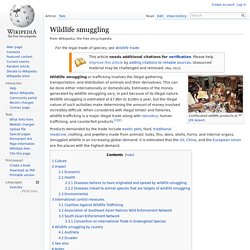
This can be done either internationally or domestically. Wildlife Trade. Our work Display of illegal wildlife products used in Chinese medicine confiscated by customs officers at Heathrow Airport, UK. © WWF-Canon/Edward PARKERWildlife trade is any sale or exchange of wild animal and plant resources by people.
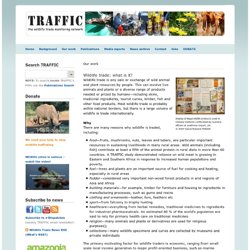
This can involve live animals and plants or a diverse range of products needed or prized by humans—including skins, medicinal ingredients, tourist curios, timber, fish and other food products. Most wildlife trade is probably within national borders, but there is a large volume of wildlife in trade internationally. Why There are many reasons why wildlife is traded, including: food—fruits, mushrooms, nuts, leaves and tubers, are particular important resources in sustaining livelihoods in many rural areas. The primary motivating factor for wildlife traders is economic, ranging from small scale local income generation to major profit-oriented business, such as marine fisheries and logging companies.
Over-exploitation is a major concern: 5 Animals That are Victims of the Exotic Pet Trade. The wild at heart do not belong in a cage.
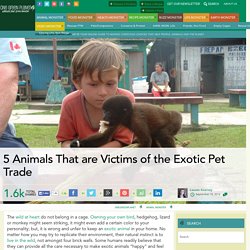
Owning your own bird, hedgehog, lizard or monkey might seem striking, it might even add a certain color to your personality; but, it is wrong and unfair to keep an exotic animal in your home. No matter how you may try to replicate their environment, their natural instinct is to live in the wild, not amongst four brick walls. Some humans readily believe that they can provide all the care necessary to make exotic animals “happy” and feel “at home,” but the fact remains: wild animals belong in the wild. Hunting and Wildlife Trade.
As the second-largest market for ivory in the world, the United States recently announced that it will ban the trade within its borders through a series of new rules.
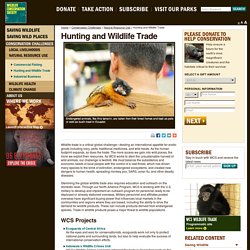
The editorial board of the New York Times explores the implications. The following statement was released today by Dr. John G. Robinson, WCS Chief Conservationist and Executive Vice President of Conservation and Science. The Illegal Exotic Pet Trade. Many people who see exotic animals being kept as pets don't think about the origins of that animal.
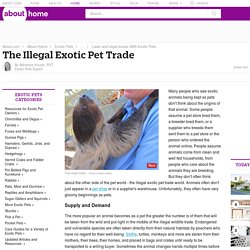
Some people assume a pet store bred them, a breeder bred them, or a supplier who breeds them sent them to a pet store or the person who ordered the animal online. People assume animals come from clean and well fed households, from people who care about the animals they are breeding. But they don't often. Illegal Wildlife Trade. The world is dealing with an unprecedented spike in illegal wildlife trade, threatening to overturn decades of conservation gains.

Ivory estimated to weigh more than 23 metric tons—a figure that represents 2,500 elephants—was seized in the 13 largest seizures of illegal ivory in 2011. Poaching threatens the last of our wild tigers that number as few as 3,200. Wildlife crime is a big business. Inside The Exotic Animal Trade. Wipe Out The Wildlife Trade Before It Wipes Them Out. The Dirty Side of the Exotic Animal Pet Trade. When Miami airport inspectors asked a man arriving from Havana, Cuba to raise his pants legs, they were surprised to find 44 birds strapped to his legs.
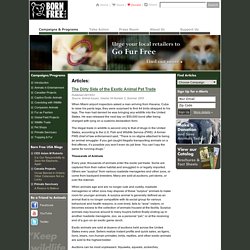
The man had denied he was bringing any wildlife into the United States. He was released the next day on $50,000 bond after being charged with lying on a customs declaration form. Illegal wildlife trade. What is the Illegal Wildlife Trade?

The illegal wildlife trade is one of the biggest threats to the survival of some of the world’s most threatened species. In fact it’s second only to habitat destruction as a cause of loss for many species.